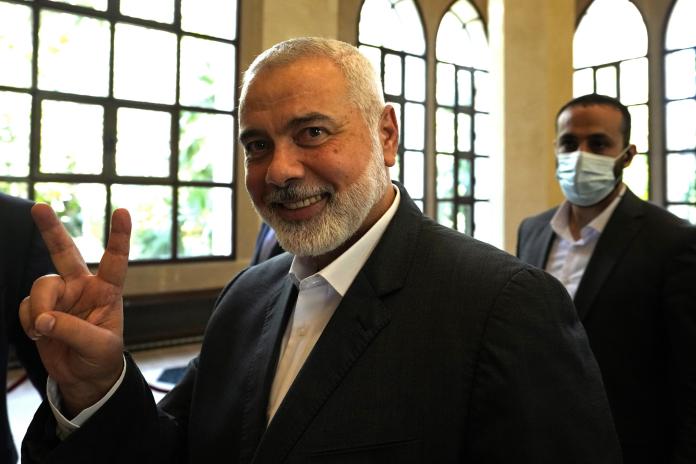Tensions between Hezbollah and Israel have escalated in the past two days following the assassination of a prominent Hezbollah senior commander, Muhammad Nimah Nasser. In response, Hezbollah launched more than 200 rockets and drones at Israel, which retaliated with airstrikes on southern Lebanon.
These developments raise concerns about the conflict widening, especially amid signs of a potential “breakthrough” in ceasefire negotiations in Gaza, the primary trigger for the Israeli-Lebanese front.
In the midst of these events, a Hamas delegation met with Hezbollah Secretary-General Hassan Nasrallah.
The meeting is routine, given the ongoing coordination between the two sides in their battles with Israel. However, there is concern over the possibility of Israel launching a wide-scale war against Hezbollah in Lebanon.
Escalation or Calming Down?
Nasrallah met with a Hamas delegation led by Khalil al-Hayya on Friday to discuss the situation in Gaza and the latest ceasefire negotiations.
A statement from the group said, “The latest security and political developments in Palestine, particularly Gaza, were reviewed. The two sides reaffirmed their continued coordination at all levels to achieve their desired goals.”
The meeting aims to calm things down since neither Hamas nor Hezbollah wants Israel to start a war in the north right now.
The meeting is part of ongoing negotiations that could lead to a “comprehensive calm.” Hamas wants to coordinate with Hezbollah for the possibility that it might need them again if an agreement is reached and Israel launches a war despite it.
“Hamas and Hezbollah are in a battle, and there are currently concessions being made. Hamas has not insisted on the necessity of a permanent ceasefire in the first phase of the agreement, but its focus is currently on high-profile Palestinian prisoners. It is coordinating with Hezbollah on this matter.”
After months of stagnation in negotiations to halt the war in Gaza and release hostages held in the strip, Israeli Prime Minister Benjamin Netanyahu agreed on Thursday to send a delegation to resume indirect negotiations with Hamas. This followed the movement’s announcement that it had exchanged “new ideas” with mediators to end the war.

On Wednesday night, Hamas said in a statement that its political bureau chief, Ismail Haniyeh, had contacted mediators in Qatar and Egypt in the past few hours to discuss ideas the movement is trading with them to reach an agreement to end the invasion in Gaza.
Lebanese military expert Najee Mulaeb considered Hezbollah and Hamas meetings routine and repeated.
“The meeting’s circumstances after Hamas’s response to the ceasefire proposal could be the direct reason for the meeting. Also, to discuss the escalation, which we see is a response to the assassination of Hezbollah’s senior commander, Muhammad Nimah Nasser.”
End of One War, Beginning of Another?
Israeli leaders have long threatened to carry out attacks against Hezbollah in Lebanon, aiming to eliminate its capabilities as they tried with Hamas, a war that the United States, France, and other Western countries are provoking.
Hezbollah announced on Thursday that it targeted Israeli military positions with a barrage of rockets and drones in response to the assassination of one of its commanders, increasing fears of escalating conflicts.
Israeli military spokesman Avichay Adraee confirmed via X that Israeli warplanes “In the past hours, warplanes raided a Hezbollah terrorist structure in the Mays al-Jabal area and a military building for the terrorist party in Aita al-Shaab,” this was written in Arabic.
أغارت طائرات حربية في الساعات الماضية على بنية إرهابية لحزب الله في منطقة ميس الجبل ومبنى عسكري للحزب الارهابي في عيتا الشعب. pic.twitter.com/vgDxJT171X
— افيخاي ادرعي (@AvichayAdraee) July 4, 2024
The United Nations warned about the recent escalation between the two sides. UN Secretary-General’s spokesperson, Stephane Dujarric, said on Wednesday, “We are very concerned about the escalation and exchange of fire,” warning of the danger to the entire region “if we find ourselves in the midst of a full-scale conflict.”
Mulaeb noted that Israel is the one escalating, saying, “In the past two weeks, there was no escalation from Hezbollah, but Israel did, and the group was responding to that.”
“I do not expect any change from Hezbollah on this matter. It adopts a strategy of ‘if they escalate, we escalate,’ referring to expanding the battlefront on the Lebanese-Israeli border.”
Mulaeb emphasized that Hezbollah does not intend a large-scale war “but it retains large arsenals and a big target bank, and what we fear is Israel’s decision to launch a war.”
Currently, Israel’s priority is to return northern residents to their homes after nine months of leaving them. If Hezbollah does not stop the attrition war, these residents will continue to pressure the government to launch a full-scale war and remove the threat completely.
With the recent escalation, it seems Hezbollah sees that things are sliding towards a full-scale war, which neither it, Hamas, Israel, America, nor any regional state wants.
The solution to the entire matter is for Israel to agree to a ceasefire deal in Gaza, with the United States pressuring it to do so “after Hamas defused the crisis and made concessions in its recent response.”
The recent round of ceasefire negotiations in Cairo aimed at halting Israel’s invasion of the Gaza Strip ended without resolution. This invasion has led to genocide and the ethnic cleansing of millions of Palestinians. Despite intensive discussions, Israel’s rejection of the proposed ceasefire terms and its subsequent ground invasion in Rafah indicate a calculated strategy to maintain leverage.


